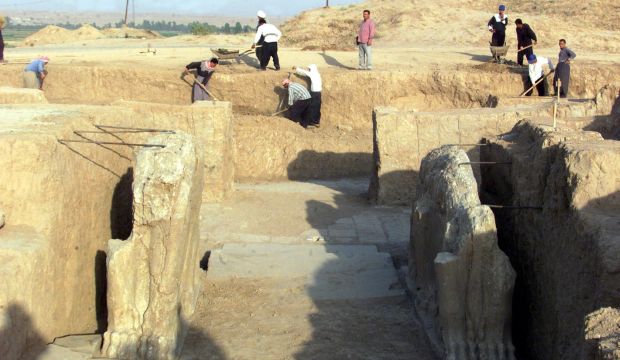The destruction of priceless historical treasures in Iraq by the Islamic State of Iraq and Syria (ISIS) proves that we do not deserve these treasures that fill our museums and lie buried beneath our sands. We in the Arab world live surrounded by a great heritage, and yet fail to understand its value both to ourselves and the rest of the world.
This is why the monuments were destroyed with an ease that belied their immeasurable importance—as if they were mere obsolete toys.
In order to protect the artifacts of our ancient ancestors and those who built these civilizations, we must lend them to those who know their value and can maintain them until the day comes when we mature and can bear this historical responsibility. Only then will we have the right to ask for them back.
Neither ancient nor modern history has witnessed anything close to the barbarism and destruction that ISIS recently wrought upon the ancient site of Nimrud and the treasures of the Mosul Museum. Its militants gleefully destroyed monuments that were almost 3,000 years old. But this is, unfortunately, not a new phenomenon: extremists have previously destroyed relics in Syria, while Al-Qaeda did the same in Afghanistan, as do the fundamentalists in Libya.
This destruction takes place under the pretext that ISIS and others like it are fighting polytheism and all its various manifestations. In light of these crimes, we should reconsider our rights to our historical monuments and artifacts, and admit that we do not deserve them.
What is happening in Iraq is not a fleeting crisis. It is a deep-rooted issue that exposes us. Instead of blaming the few extremists, we must admit that we are an underdeveloped region that lives in an era of darkness and decadence due to the presence of ISIS, Al-Qaeda, and similar groups that impose their will on those around them. Therefore, we cannot say that we have any rights to historical artifacts. Our duty is to smuggle these relics to other countries, where they can be preserved, looked after, and studied at the world’s most prominent museums.
We have a long history of ignorance regarding the importance and preservation of monuments and historical treasures. Earlier this year, the Egyptian Museum admitted that the beard of Tutankhamen’s golden mask, one of the greatest artifacts of all time, was broken off during what was otherwise an ordinary cleaning job. Another example is that of late Iraqi president Saddam Hussein, who shamelessly displayed statues of himself alongside ancient ones of the Chaldean king, Nebuchadnezzar.
Late Egyptian president Gamal Abdel Nasser almost buried a whole city of relics when he decided to build the Aswan dam, and would have succeeded had foreign countries not worked to get the relics to safety. In the Arabian Peninsula, many archaeological sites and murals were destroyed because people thought they were prohibited drawings.
Fortunately for us, Western scientists and traders transferred and smuggled relics from Egypt, Iraq, Yemen and other countries. They are now preserved in the museums of France, Britain, Germany, Italy, Turkey and other countries. Although many demand the return of what was stolen, some of us know that the smuggling of these relics was a good move because, frankly, we do not deserve them.
We have not yet reached a mature phase of awareness regarding the importance of ancient artifacts. We lack the ability to preserve them, and the developed scientific means to maintain, look after and study them.
Imagine if Muslim extremists came to possess great treasures such as the statue of Nefertiti, which was smuggled to Germany at the beginning of the last century, or the statue of Queen Hatshepsut, or the head of Djedefre, or the towering obelisks, or the other thousands of Egyptian relics abroad. Imagine if Babylonian artifacts, which narrate Iraqi history and are currently on show in Britain, had stayed in Iraq. We all know they would have ended up just like the monuments that ISIS so ecstatically reduced to rubble.
Fortunately for us, some four million Arabic and Islamic manuscripts are stored in Western museums and universities. Otherwise, they would have been destroyed by the madmen of ISIS, or eaten by the mice that run rampant in abandoned storehouses in Arab museums.
